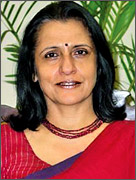Human health is at the centre of climate change
by Dr. Poonam Khetrapal Singh
 As the global community deliberates at the 16th Conference of the
Parties to the United Nations Framework Convention on Climate Change (UNFCCC)
in Cancun, Mexico, countries from South-East Asia are faced with the
task of ensuring that regional concerns are addressed in discussions of
the impact of climate change on human health. Climate change strikes at
the basic pillars of life-water, food, air and the ecosystem. As the global community deliberates at the 16th Conference of the
Parties to the United Nations Framework Convention on Climate Change (UNFCCC)
in Cancun, Mexico, countries from South-East Asia are faced with the
task of ensuring that regional concerns are addressed in discussions of
the impact of climate change on human health. Climate change strikes at
the basic pillars of life-water, food, air and the ecosystem.
Island nations like Maldives, mountainous countries like Bhutan and
Nepal, and countries like Bangladesh, Indonesia, India, Sri Lanka and
Thailand with large populations living along the coast are most
vulnerable. More frequent extreme weather events is one of the expected
manifestation of climate change. The region has in the last few years
experienced cyclones, floods and heat waves that have killed thousands
and left millions more homeless. In addition, climate change is expected
to increase the burden of malnutrition, diarrhoea, malaria and dengue,
all of which are climate-sensitive. Such effects are likely to overwhelm
the already overburdened health infrastructure in the region.
The UNFCCC recognized the adverse impact of climate change on human
health in 1992. It urged parties to formulate policies and actions to
minimize the adverse effects on economy, public health and the quality
of the environment. Yet 17 years later, only 1 of the 47 nations
mentioned human health as a consideration in the preparatory submissions
to the UNFCCC negotiations for the Copenhagen meeting in December 2009.
This silence about health indicates a serious blind spot. Human health
seems to be lost in the debate on climate change science, emissions
targets and trading, differential responsibilities and threats to
livelihoods and shelter.
The evidence is clear: climate change will directly impact human
health. It is time to act now. Resources need to be channelled to
support adaptation measures by the health and environment sectors. The
global community needs to support efforts, technically and financially,
to protect health from climate change in this region.
Health research to estimate the economic impact of climate sensitive
diseases on developing countries needs to be prioritized.
Countries from South-East Asia have demonstrated political will at
the highest level. This is evident in the New Delhi Declaration by the
Health Ministers from 11 countries of the region in 2008, which was
reiterated more recently by a conference of regional members of
parliaments at Thimphu, Bhutan, and in the Dhaka declaration by
ministers and senior officers from ministries of health and environment.
But the health effects of climate change-and the damage-are already
upon us. It is time for the countries that are most vulnerable to
climate change to voice their concerns and ensure that human health
becomes the central theme for climate change discussions and agreements.
(The writer is the Deputy Regional Director, WHO South-East Asia) |

